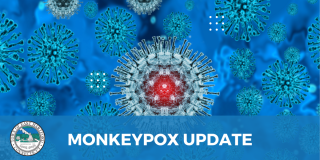Monkeypox Update

The Centers for Disease Control and Prevention (CDC) is tracking multiple cases of monkeypox that have been reported in several states that don’t normally report monkeypox, including Connecticut. Monkeypox is rare and does not spread easily between people without close contact. However, if residents have an unexplained rash, the East Hartford Health Department encourages individuals to talk to their healthcare providers right away and do NOT have sex. If individuals have flu-like symptoms, such as fever, aches, and swollen lymph nodes, please call your healthcare provider immediately.
The CDC does not recommend widespread vaccination against monkeypox at this time. However, vaccination may be recommended for some people who:
- Are close personal contacts of people with monkeypox
- May have been exposed to the virus
- May have increased risk of being exposed to the virus due to travel, occupation, etc.
In Connecticut, vaccine is also available to people who meet all of the following conditions:
- Gay, bisexual, or other man who has sex with men, and/or transgender, gender non-conforming, or gender non-binary
- Have had multiple or anonymous sex partners in the last 14 days
- Age 18 or older
- Connecticut resident, regardless of immigrations stus
Get the Facts
Monkeypox is spread mostly by skin-to-skin contact, so condoms aren’t very effective in preventing transmission. Any kind of close personal contact (including kissing, cuddling, sharing drinks, and sex) can spread monkeypox. Sharing bedsheets or clothing that have been in contact with an infected person can also spread the virus.
- Monkeypox is a rare disease caused by the monkeypox virus
- Monkeypox can make you sick including a rash or sores (pox), often with an earlier flu-like illness
- Monkeypox can spread to anyone through close, personal, often skin-to-skin contact including:
- Direct contact with monkeypox rash, sores, or scabs
- Contact with objects, fabrics (clothing, bedding, or towels), and surfaces that have been used by someone with monkeypox
- Through respiratory droplets or oral fluids from a person with monkeypox
- This contact can happen during close contact including:
- Sexual contact (Oral, anal, and vaginal sex or touching the genitals or anus of a person with monkeypox)
- Hugging, massage, kissing, and/or talking closely
- Touching fabrics and objects during sex that were used by a person with monkeypox, such as bedding, towels, etc.
- We know the virus can be spread in fluid or pus from monkeypox sores, and are trying to better understand if the virus could be present in semen, vaginal fluids or other body fluids
Symptoms
Early flu-like symptoms of monkeypox can include:
- Fever
- Headache
- Muscle aches and backache
- Swollen lymph nodes
- Chills
- Exhaustion
- A rash or sores (sometimes located on or near the genitals or anus, but sometimes in other areas like the hands, feet, chest or face)
- Sores will go through several stages before healing
- Sores may be inside the body, including the mouth, vagina, or anus
- Some people experience a rash or sores first, followed by other symptoms and some only experience a rash or sores
- Monkeypox can be spread from the time symptoms start until all sores have healed and a fresh layer of skin has formed – this can take several weeks
How Can I Get Tested?
To test for monkeypox, a healthcare provider will get a sample from a lesion (the rash) caused by the illness. You cannot be tested for monkeypox if you do not have the rash. This sample will then be sent to the Connecticut State Public Health Laboratory or a commercial lab like Quest.
If you think you may have a monkeypox rash, call your healthcare provider immediately for information on getting tested.
Where Can I Get Vaccinated?
Vaccine is extremely limited at this time. For those who meet the above eligibility requirements, the vaccine will be available at the following local community-based health centers by appointment only:
- Intercommunity Health (56 Coventry Street, Hartford)
- Hartford Gay and Lesbian Health Collective (1841 Broad St, Hartford)
For a full list of clinic sites, please view the CT-DPH website. For transportation assistnace to a clinic site, please call the East Hartford Health Department at 860-291-7324.
For more information about treatment, prevention, and vaccination, please review the following resources:
- Monkeypox: Get the Facts flyer
- Monkeypox Vaccination flyer
- CDC Frequently Asked Questions page. To speak with a public health nurse, contact the East Hartford Health Department at 860-291-7324.

